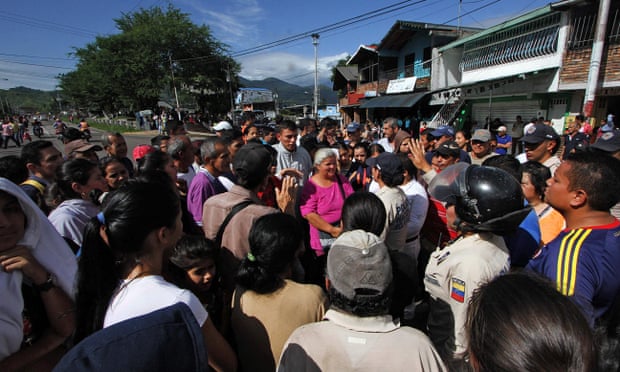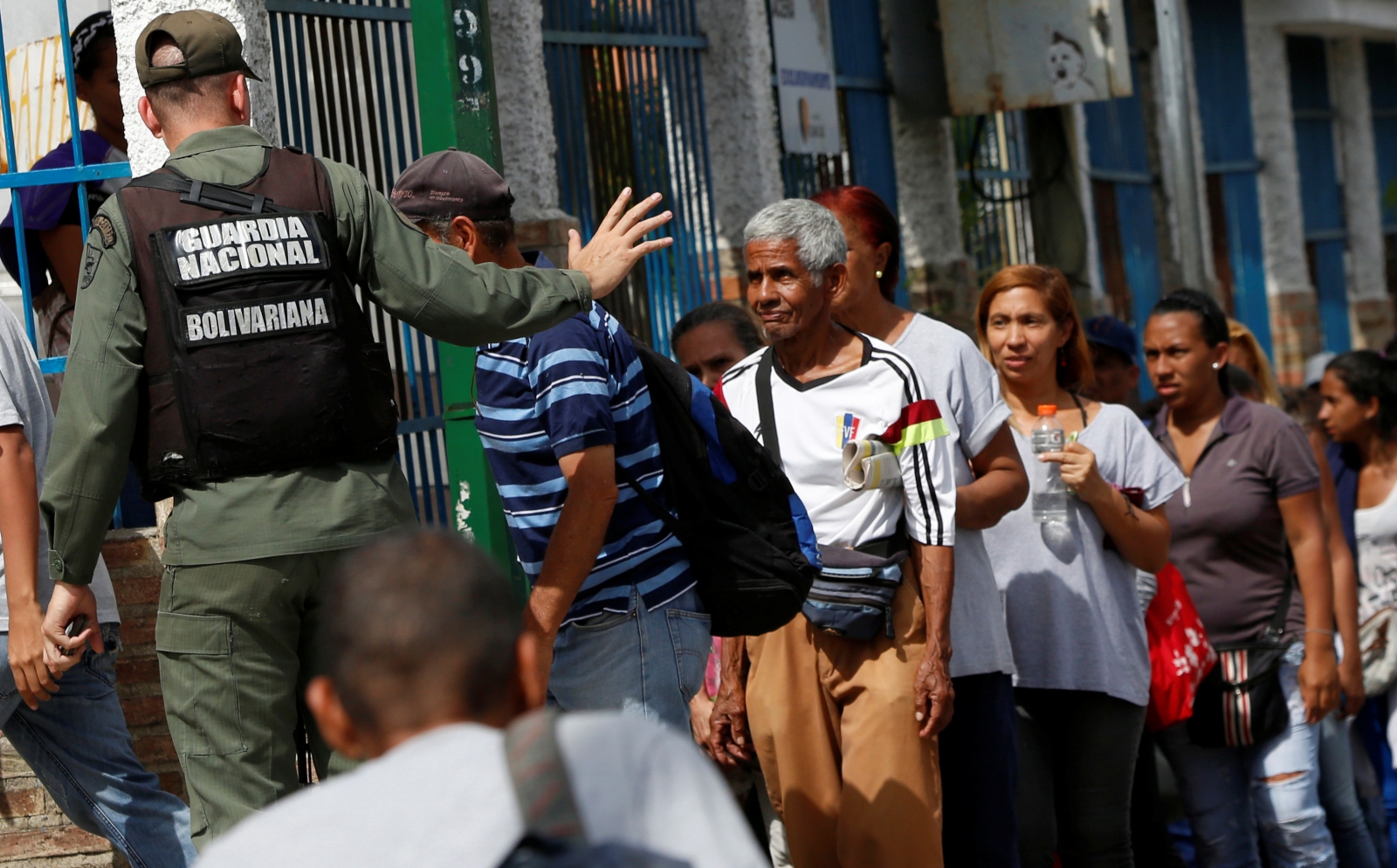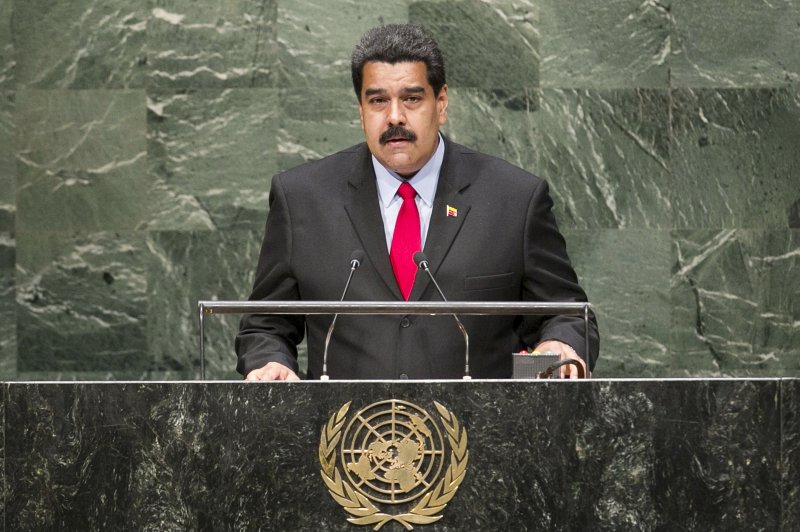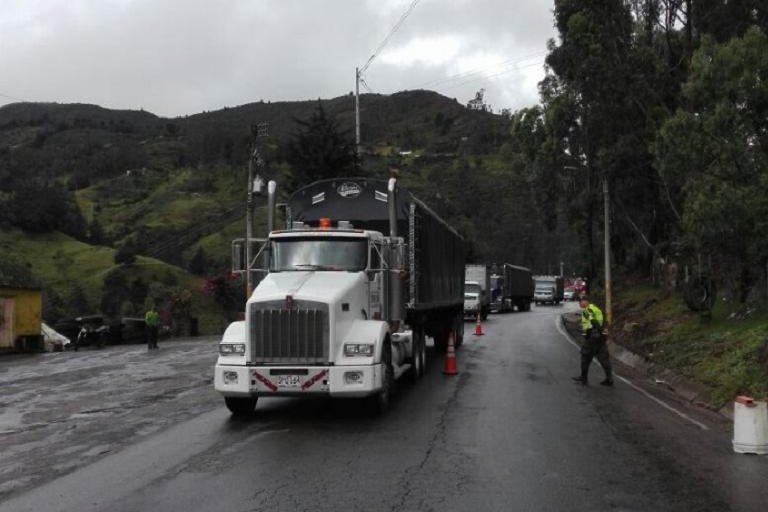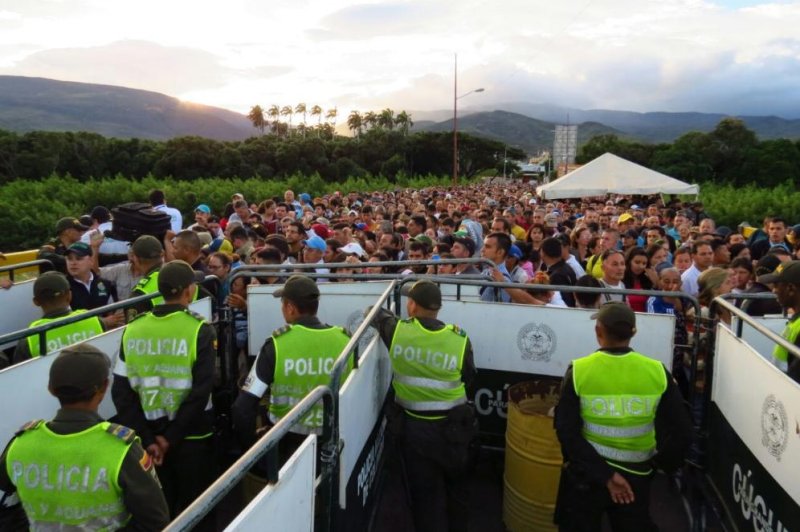In the darkness the warehouse looks like any other, a metal-roofed hangar next to a clattering overpass, with homeless people sleeping nearby in the shadows.
But inside, workers quietly unload black plastic crates filled with merchandise so valuable that mobs have looted delivery vehicles,shot up the windshields of trucks and hurled a rock into one driver's eye. Soldiers and police milling around the loading depots give this neighborhood the feel of a military garrison.
"It's just cheese," said Juan Urrea, a 29-year-old driver, as workers unloaded thousands of pounds of white Venezuelan queso from his delivery truck. "I've never seen anything like this before."
The fight for food has begun in Venezuela. On any day, in cities across this increasingly desperate nation, crowds form to sack supermarkets. Protesters take to the streets to decry the skyrocketing prices and dwindling supplies of basic goods. The wealthy improvise, some shopping online for food that arrives from Miami. Middle-class families make do with less: coffee without milk, sardines instead of beef, two daily meals instead of three. The poor are stripping mangoes off the trees and struggling to survive.
"This is savagery," said Pedro Zaraza, a car oil salesman, who watched a mob mass on Friday outside a supermarket, where it was eventually dispersed by the army. "The authorities are losing their grip."
What has been a slow-motion crisis in Venezuela seems to be careening into a new, more dangerous phase. The long economic decline of the country with the world's largest oil reserves now shows signs of morphing into a humanitarian emergency, with government mismanagement and low petroleum prices leading to widespread shortages and inflation that could surpass 700 percent this year.
The political stakes are mounting. Exhausted by government-imposed power blackouts, spiraling crime, endless food lines, shortages of medicine and waves of looting and protest, citizens are mobilizing against their leaders. In recent days, Venezuelans lined up to add their names to a recall petition that aims to bring down the country's president,
Nicolas Maduro, and put an end to the socialist-inspired "revolution" ignited 17 years ago by
Hugo Chavez.
"This can't continue," said Angel Rondon, a mechanic, who now sometimes eats just once a day. "Things have to change."
A woman who had been standing in line outside a center in Caracas that certifies signatures for a referendum to recall President Nicolas Maduro
shouts slogans against Venezuela's government after learning that the center had closed, without attending to those still standing in line.
Sickening free-fall
The rumor spread quickly on a recent Tuesday evening in the poor farmlands near Barlovento an hour east of Caracas: A truck carrying rice had tipped over and food was free for the taking. Glenis Sira, a mother of seven, grabbed a plastic bag and ran from her cinder block shack. More than 1,000 people joined her in scrambling to reach the village of La Fundacion before they realized there was no rice truck, only rumor.
"We have never had this level of need," said Sira, one of several witnesses who described the melee.
For decades Venezuela was one of Latin America's more stable and developed democracies, with a middle class accustomed to the benefits of oil wealth. Economic crises in the 1980s and 1990s battered many Venezuelan families. But the Chavez era was marked by rising oil prices and declining poverty, leaving few people prepared for the sickening free-fall of the last few years.
Sira has long been a proud "Chavista," convinced that government spending could create a more equal society. Chavez's government, flush with oil money and billions of dollars in foreign loans, gave her the Madre de Barrio subsidy for mothers in extreme poverty. Another program helped residents to finish houses under construction. Youths from her community received scholarships.
"I always lived for the revolution," she said.
But many of the welfare programs started by Chavez have dried up, and the nearest store has little more than two-liter bottles of Pepsi and packs of Pall Mall cigarettes. Under Chavez, the government established a network of government-run supermarkets that sold basic foods at subsidized prices. But inflation has put even these bargains out of reach for many people. A single kilogram of yucca - about two pounds - now costs about one-third of the weekly minimum wage.
Sira's neighbors hunt for deer and armadillos for subsistence and barter their meager catch. She lives off what she can grow - yams, tomatoes, corn - or what she can forage. Once a cacao-producing region, the area has been devastated by drought.
"I'm a Chavista and damn it, this situation is hard," she said. "That is why the revolution is being killed. Because we are hungry."
Falling oil prices
Venezuela's ability to produce food and other goods has dwindled over the years as the government has expropriated private companies, expanded price controls, and otherwise discouraged private production. Corn, rice and other foods once grown domestically now have to be imported.
In the past two years, oil prices have dropped by half to below $50 per barrel, the economy has contracted severely, and imports have grown more unaffordable. Private companies have shut down for lack of access to government-controlled dollars to pay for raw materials. The government has so far prioritized making debt payments to avoid default while cutting back on imported products, including food. In recent days, airlines such as Lufthansa, LATAM, and Aeromexico have stopped flying to Venezuela, as the strict currency controls made it difficult for them to be paid in full.
About 87 percent of people say they don't have enough money to buy food, according to a recent study by Simon Bolivar University.
"We have not yet seen the climax of the crisis," said Luis Vicente Leon, director of the polling firm Datanalisis, who estimated that retail food outlets in Caracas lack about 80 to 85 percent of their usual products. "Supplies have deteriorated to a very significant degree and it's probable that things will continue to get worse."
This year, Maduro decreed that food distribution would be placed under the control of thousands of local citizen committees that critics say are biased toward government supporters.That meant subsidized food would be diverted from the poorly stocked government-run supermarkets.
Over the first five months of this year, Venezuelans have violently looted businesses - or tried to do so - at least 254 times, according to the Venezuelan Observatory of Social Conflict. The number of protests over food has risen each month this year, to 172 in May. Several people have died and hundreds more have been arrested in incidents of unrest across the country.
Maduro's administration has blamed the incidents on an "economic war" led by foreigners and private businessmen who, it claims, are hoarding food supplies to destabilize the government.
"There is no humanitarian crisis," Foreign Minister Delcy Rodriguez told an Organization of American States meeting last week .
A child in her house in Barlovento waits for lunch, which consists of only boiled yam.
Bribes of cheese
Transporting the nation's food means running a gantlet of need. On June 20, hundreds of protesters blocked a highway in an area called El Guapo, east of Caracas, paralyzing dozens of delivery trucks. During the day-long standoff, driver Jonathan Narvaes, 32, watched as residents ransacked trucks carrying flour and pasta. Soldiers used tear gas to disperse the crowds.
"My boss wants me to try again," Narvaes said. "I told him, 'Boss, they almost killed me on Monday.' "
Drivers unloading cheese in Caracas, after a 15-hour journey from near the country's western border with Colombia, said that trucks have been shot at and battered with rocks and that they must pay bribes in money or cheese to military checkpoints along the way.
"Similar situations are happening in almost the whole country," said Alfredo Sanchez, the head driver of a delivery company called Paisa.
A driver who gave his name as Tony, with the Lacteos La Guanota company, said that when he drove through north-central Aragua state one recent day, protesters surrounded trucks and hauled away the cargo of pigs and chickens.
"I was very afraid," he said.
Andrea Sira, 11, in her home on the outskirts of Barlovento. The only food in her fridge was water and mangos.
Some wealthier consumers have resorted to having food shipped to Venezuela. Soraya Cedillo, the owner of a courier company, said that 70 percent of her customers are Venezuelans living in the United States buying products such as corn flour, sugar, powdered milk, toilet paper and tampons for relatives back home.
Two months ago, Maria Eugenia Rodriguez, a dentist and mother of two, began shopping online for products such as powdered milk, sugar and bread.
"I buy Splenda from Amazon," she said, referring to the online retailer. "Every few weeks I get a box full of staples from a courier in the States that arrives to the door of my house."
In Caracas, shopping lines have grown so long that they have created ecosystems of commerce. Outside the Plan Suarez government supermarket in Caracas, vendors sold cigarettes and lemonade out of rusty shopping carts one recent day to the hundreds who had lined up. To cut down on crowds, officials allow in each day only people with certain numbers on their national identification cards.
"We're waiting without even knowing what they will bring today, or if they'll bring anything," Yorilei Ramos, 51, said as she stood alongside her 9-year-old daughter. "Your kids are crying, 'I'm hungry,' and you have to tell them, 'I have nothing.' "




